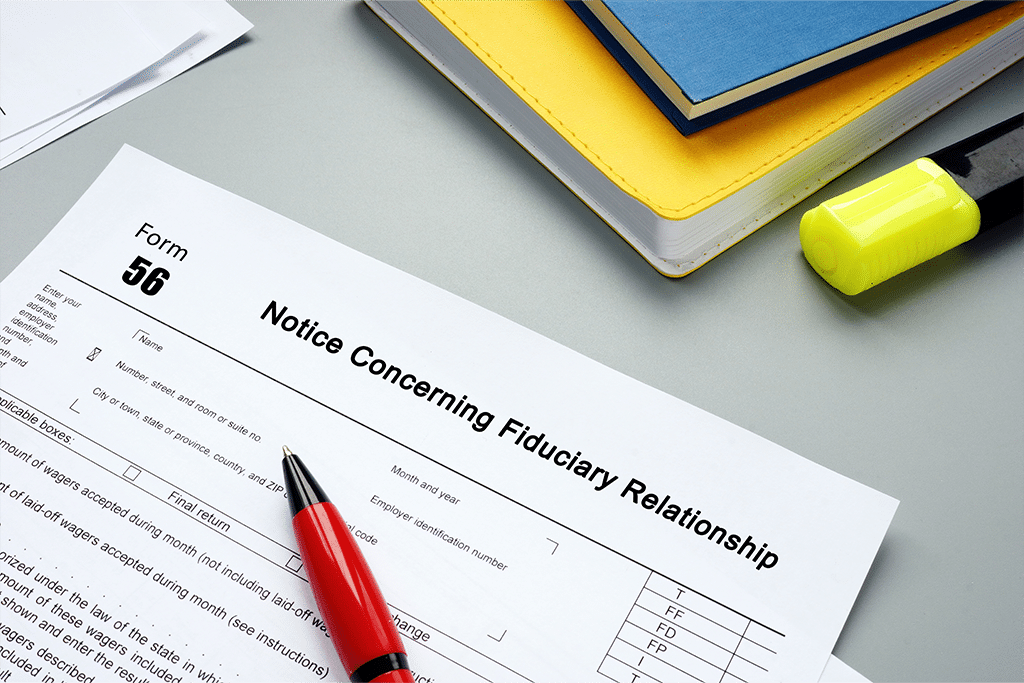How to Fill Out IRS Form 56: Step-by-Step Instructions for Expats

Filing Form 56 correctly the first time prevents weeks of IRS correspondence delays and processing problems. Form 56 requires specific information in exact formats, and a single error can delay your fiduciary recognition when you need it most.
Here’s the relief: Form 56 processing is standardized, and the IRS provides clear instructions for each section. When completed properly, most forms are processed within 4-6 weeks.
Whether you’re an American expat suddenly appointed as executor or taking on trustee responsibilities while living abroad, this step-by-step guide walks you through each section of Form 56 so you can establish your fiduciary authority quickly and correctly.
Learn when and how to file IRS Form 56 as an American expat serving as executor, trustee, or guardian. Expert guidance for fiduciary tax obligations abroad.
Before you start: Required information checklist
Gather these documents before touching the form:
For the Person You’re Representing:
- Full legal name (exactly as it appears on Social Security card)
- Social Security Number or Individual Taxpayer Identification Number
- Date of birth (if deceased, date of death)
- Last known address
- Employer Identification Number (if applicable for business or estate)
For Yourself as Fiduciary:
- Your SSN or ITIN
- Current mailing address (where you want IRS correspondence sent)
- Court appointment documents
- Date your fiduciary appointment became effective
Expat preparation tips
- Address considerations: Use your current international address to receive mail reliably. The IRS will send all future correspondence about the taxpayer to this address.
- Documentation: Prepare certified copies of court appointments, death certificates, or trust documents. International mail delays make having complete documentation from the start essential.
How do you fill out each section of Form 56?
Top section: Basic identification
- Name of person for whom acting: Enter the taxpayer’s full legal name exactly as it appears on their Social Security card or most recent tax return: no nicknames or abbreviations.
- Decedent’s date of death: Only complete if the person is deceased. Use MM/DD/YYYY format.
- Your information: Enter your full name and current mailing address where you want IRS correspondence sent.
Part I: Information about the person for whom you are acting
- Identifying number: Enter the nine-digit SSN or ITIN without dashes. Double-check this number as errors here cause significant processing delays.
- Address: Use the taxpayer’s last known address if deceased, or current address if still living.
- Entity type: Check the appropriate box (individual, estate, trust, etc.).

Part II: Fiduciary information and authority
- Your identifying number: Enter your SSN, ITIN, or EIN if you’re acting as an entity.
- Fiduciary capacity: Check the box that describes your role:
- Executor/Administrator for estates
- Trustee for trusts
- Guardian/Conservator for incapacitated persons
- Receiver for business proceedings
- Date qualified: Enter the date you were officially appointed as fiduciary.
Part III: Court information (if applicable)
Complete only if you were court-appointed:
- Name of the court that appointed you
- Date of court order
- Type of proceeding
Part IV: Signature and certification
- Critical requirement: You must physically sign and date the form. Electronic signatures are not accepted for Form 56.
- Print name and title: Include your complete name and fiduciary title.

What mistakes should you avoid?
- Wrong identification numbers: A single incorrect digit in SSNs, ITINs, or EINs delays processing for weeks. Verify these numbers twice before submitting.
- Incomplete addresses: Ensure all addresses are complete with apartment numbers, postal codes, and country information for international addresses.
- Missing court information: If court-appointed, provide complete details. Incomplete information triggers IRS requests for clarification.
- Signature errors: Form 56 requires your physical signature. Do not use electronic signatures or stamps.
- Wrong IRS office: Standard fiduciaries mail to the service center where the taxpayer files returns, not where you live as an expat.
Where should you submit Form 56?
- Standard fiduciaries: Mail to the IRS service center where the person you’re representing typically files tax returns. Find the correct address here.
- Receivers and assignees: File with the Advisory Group Manager of the appropriate IRS area office within 10 days of appointment.
- Express delivery: When living abroad, consider FedEx or DHL for time-sensitive filings. Use trackable services and keep delivery confirmations.
Get the Free Download That Makes Filing Taxes Simple

How do common expat scenarios affect Form 56 filing?
Scenario 1: Estate executor living abroad
You’re working in London when appointed executor of a parent’s estate in Florida.
- Challenge: Coordinating with the Florida probate court while managing IRS requirements.
- Solution: File Form 56 with copies of all court documents using express mail services.
Scenario 2: International trust trustee
You’re appointed trustee of a family trust while living in Germany.
- Challenge: Annual trust tax filing requirements with international beneficiaries.
- Solution: Establish clear systems and consider professional support for ongoing compliance.
Scenario 3: Guardian appointment while behind on personal taxes
You become a guardian while living abroad and are behind on your own expat tax filings. Priority: Address personal compliance through Streamlined Filing Procedures while establishing fiduciary authority.
What happens after you submit Form 56?
- Processing time: Allow 4-6 weeks for processing, longer during busy seasons.
- No confirmation: The IRS doesn’t send receipt confirmation, but you’ll know it’s processed when taxpayer correspondence starts coming to your address.
- Immediate responsibilities: You’re responsible for all tax matters from your appointment date, even before Form 56 is processed.
- Record keeping: Maintain copies of Form 56 and all related documents for your records and potential court requirements.
When should you get professional help?
Complex situations that require expert guidance:
- Multiple jurisdictions with assets or beneficiaries in different countries
- International trusts with foreign beneficiaries or assets
- Business fiduciary roles as receiver or assignee for business entities
- Estate tax requirements exceeding federal or state exemption thresholds
- Ongoing Foreign Tax Credit or FEIE calculations
Red flags indicating you need professional support:
- You’re unsure about which IRS service center to use
- The fiduciary relationship involves multiple tax years of catch-up filing
- You need to coordinate with foreign tax authorities
- Estate or trust income exceeds Foreign Earned Income Exclusion limits
Don’t risk costly delays with incorrect filing
Filing Form 56 incorrectly can create weeks of delays and correspondence headaches, especially when you’re managing time-sensitive fiduciary duties from abroad. One mistake can derail estate administration or trust management processes.
The stakes are too high to guess.
Greenback specializes in helping American expats handle complex tax situations, including fiduciary responsibilities. Our CPAs and Enrolled Agents have extensive experience with Form 56 preparation and know how to coordinate fiduciary duties with expat tax obligations.
We’ll ensure your Form 56 is completed correctly the first time, properly submitted to the right IRS office, and coordinates seamlessly with any related tax return filings. Whether you’re dealing with simple estate administration or complex international trust management, you’ll have peace of mind knowing it was handled correctly.
Ready to get your Form 56 filed correctly the first time? Contact us, and one of our customer champions will gladly help. If you need specific advice on your tax situation, click below to get a consultation with one of our expat tax experts.
This article is for informational purposes only and does not constitute legal or tax advice. Individual situations vary, and you should consult with qualified professionals for guidance specific to your circumstances.



